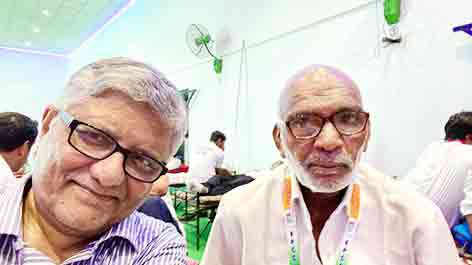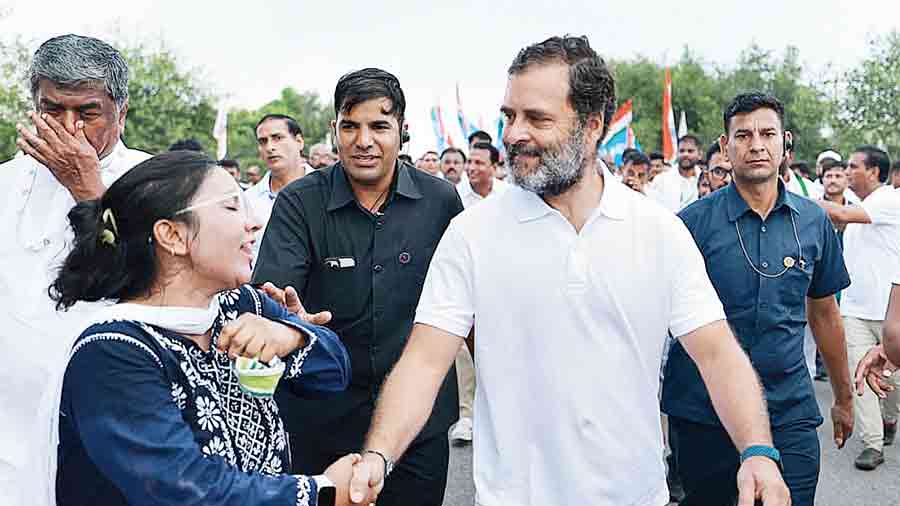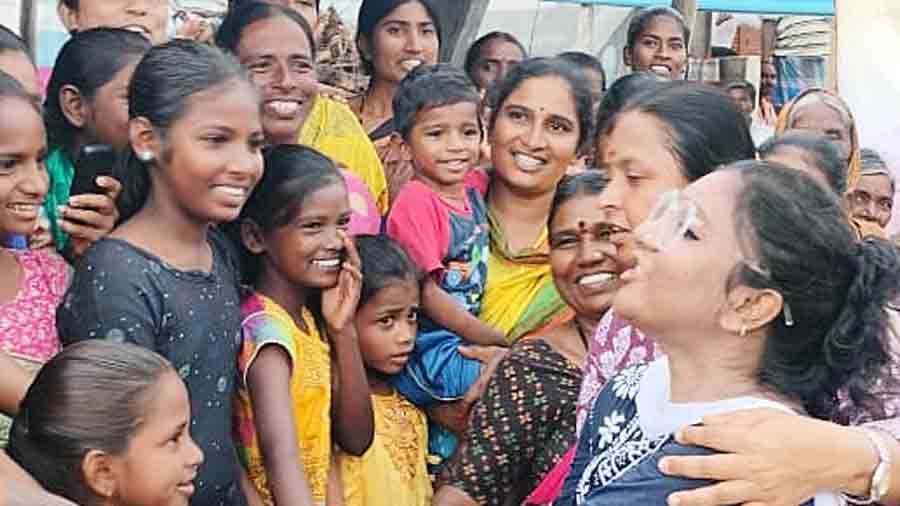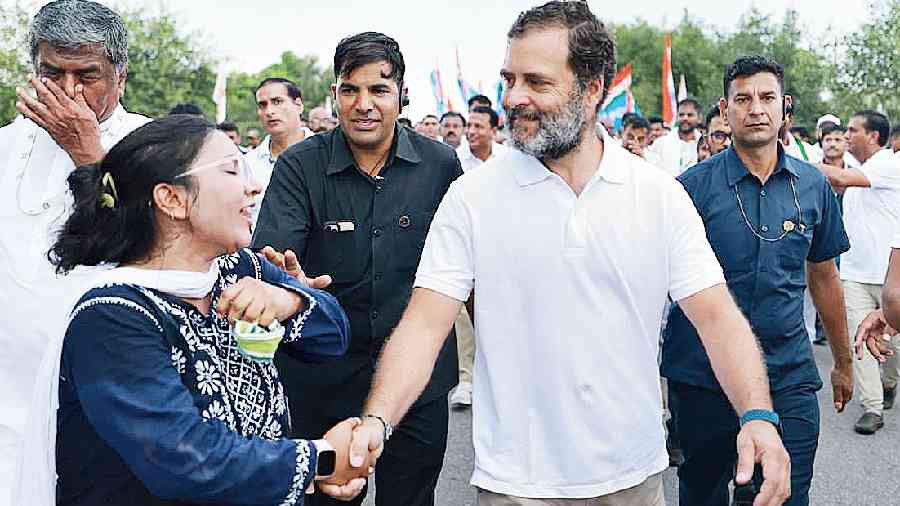Two Kolkatans who took part in Rahul Gandhi’s Bharat Jodo Yatra over the weekend found in the march a “mini India” that had a place for everyone.
Neither of them is a Congress member. But they travelled thousands of kilometres because they felt an association with the issues raised by the yatra, because they wanted unemployment and price rise, not religion, to be the dominant discourse in politics.
One of them, Nousheen Baba Khan, is a lecturer of political science at a college in central Kolkata. The other, septuagenarian Shantanu Sinha Chaudhuri, is a former English teacher.
They flew to Bangalore on October 14 morning and drove to Bellary, where they reached in the evening. On October 15 and 16, they walked along with tens of thousands of people up to the Karnataka-Andhra Pradesh border.
Khan came back to Kolkata on Monday and Chaudhuri went to Bangalore to spend some days with his daughter, who is settled there.
In the 48 hours spent on the road and in the camps, they found in Bharat Jodo a rallying cry that united dialects, faiths and professions. Khan and Chaudhuri met many people like themselves — who are not associated with any political party but attached to the causes espoused by the march.

Santanu Chaudhuri (left) with a Congress worker from Ghaziabad. Sourced by The Telegraph
Mini India
“The yatra is a mini capsule of the idea of India that I have grown up with. It is a melting pot of Hindus and Muslims, villagers and city-bred people, poor and the rich,” said Khan, who had been tracking the yatra from Day One, mostly on social media.
“I thought the initial exuberance would fizzle out. But days passed by and the exuberance only seemed to be swelling. I don’t think something like this has happened in India in many, many years,” said Khan, who was part of the protests against the citizenship matrix that rocked Kolkata, and the rest of the country, before Covid stalled them.
Khan and Chaudhuri were among a team of six.
“The motley crowd of six yatris consisted of an exceedingly soft-spoken activist politician, an environmental activist and author, a tailor who’s doing MA, an engineer, a young college professor, and me. We were between early twenties and early seventies. The six of us, who speak four different languages at home, have come to join the Bharat Jodo Yatra. As you might have guessed, a tiny bit of jodo-ing has already happened,” Chaudhuri says in a Facebook post on his first impression of the yatra.
As the yatra passed by villages, thousands of bystanders joined the marchers in shouting slogans despite language barriers. “Jodisi Jodisi, we would shout from the rally. Bharatha Jodisi, the bystanders would reply,” said Khan.
Among the fellow yatris she became friends with was Visalakshmi Padmanabhan, a farmers’ rights activist who lives in Bangalore. Padmanabhan, also not affiliated to any political party, was walking because her “experience of the government and governance over the past three-four years has not been positive at all”.
“The farmers are not happy, the labourers are not happy, the middle class is not happy,” she told this newspaper over the phone from a night-halt camp on the Karnataka-Andhra border on Sunday evening.
For Chaudhuri, one of the endearing sights was the crowd of villagers — mostly women and children — who gathered on both sides of the road the yatra passed through.
Earlier on Sunday, when he was passing by Moka village in Bellary district, Chaudhuri saw a group of women standing with a basket of apples for the yatris.
“They were shabbily dressed and some of them barefooted. But the glow in their faces suggested that amid their daily struggle, they had seen a ray of hope in the yatra,” said Chaudhuri. Khan also interacted with local women in a village called Sanganakallu, in Bellary. “Most of them can’t speak fluent Hindi. But they pointed towards LPG cylinders to say they were suffering under the burden of rise in fuel prices,” she said.
“The country should be worried about soaring prices, dwindling income and unemployment, not urban Naxals. This yatra is telling things as they are,” said Khan.

Nousheen Baba Khan with Rahul Gandhi during Bharat Jodo Yatra. Sourced by The Telegraph
Walk the talk
The mood and the slogans of the yatra justified the name, said Chaudhuri, who lives in Parnasree in Behala. “The yatris are walking to spread love and unite India. The atmosphere in the yatra reflected this idea. Over two days, I never heard hai-hai or murdabad or goli maaro. There was no call to consign anyone to the dustbins of history, no appeal to pick up arms, no labelling of people or a group as traitors or no direction to anybody to relocate to another country. There was no negativity in the slogans,” Chaudhuri told this newspaper from Bangalore on Tuesday.
Apart from slogans and placards on price rise and job loss, some of the slogans that have stayed with him are “Woh todenge, hum jodenge (They will break, we’ll unite)” and “Woh danda leke todenge, hum jhanda leke jodenge (Their lathi will break, our flag will unite)”.
The yatra would start early in the morning. A band of musicians would be at the vanguard, along with local artistes in traditional ceremonial attire.
Some of them wore giant masks. They were followed by Congress volunteers and the yatris.
Usually, there is a break of a couple of hours around noon. Then, the yatra resumes and culminates in the evening. The night is usually spent in marriage halls and community centres.
“The exhilaration among the people is the biggest takeaway. Feet blistered and bodies weary and sunburnt, the yatris returned to the camps. But in that shared suffering, there was a spirit of bonhomie. Everyone looked forward to the next morning,” said Khan.

